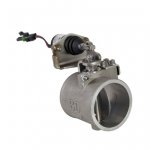- 1,290
- 1,645
- 113
- Location
- Basehor, KS
Since this has happened in the past, I thought it might be a good idea to point our esteemed members in a better direction:
1. Check your fuel cutoff solenoid as per manual and that the plunger moves absolutely freely. Dust and Humidity can get the plunger stuck or to move hard, when unit is outdoors for prolonged period of times. The protective boot gets damaged or starts to dry-rot.
The -12 manual gives us these suggestions:

2. You may want to buy and install a AC Frequency Monitor with configurable alarm relay (dry contact) and wire the contact in series with one of the two leads of the Fuel cutoff solenoid.
If the Frequency of the Power goes over the set-point (selectable), say like 65 Hz or 70 Hz, then the alarm relay is active and the Normally Closed Dry Contact will open and turn off the 24 VDC to the Fuel Cutoff Solenoid, shutting the engine down within 1 to 3 seconds
Your Cutoff Solenoid has to be in pristine condition anyway and then you can sleep well. No matter if the Genset was started manually and you went back to sleep in your warm and cozy bed or through remote start.
These units cost about $ 350.00 to $ 400.00 and this company has them for sale:
PFB01CM24 FREQUENCY MONITORING RELAY
Product Manual is posted here as pdf
1. Check your fuel cutoff solenoid as per manual and that the plunger moves absolutely freely. Dust and Humidity can get the plunger stuck or to move hard, when unit is outdoors for prolonged period of times. The protective boot gets damaged or starts to dry-rot.
The -12 manual gives us these suggestions:

2. You may want to buy and install a AC Frequency Monitor with configurable alarm relay (dry contact) and wire the contact in series with one of the two leads of the Fuel cutoff solenoid.
If the Frequency of the Power goes over the set-point (selectable), say like 65 Hz or 70 Hz, then the alarm relay is active and the Normally Closed Dry Contact will open and turn off the 24 VDC to the Fuel Cutoff Solenoid, shutting the engine down within 1 to 3 seconds
Your Cutoff Solenoid has to be in pristine condition anyway and then you can sleep well. No matter if the Genset was started manually and you went back to sleep in your warm and cozy bed or through remote start.
These units cost about $ 350.00 to $ 400.00 and this company has them for sale:
PFB01CM24 FREQUENCY MONITORING RELAY
Product Manual is posted here as pdf
Attachments
-
125.2 KB Views: 2
Last edited:



